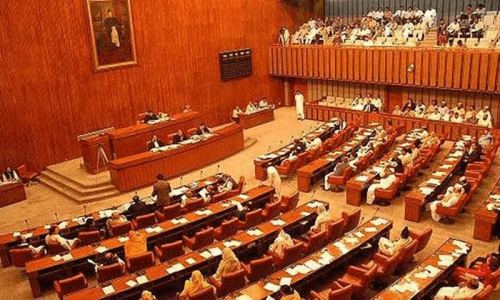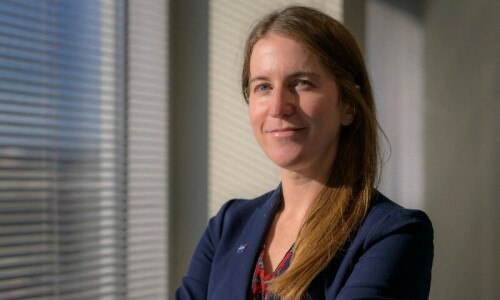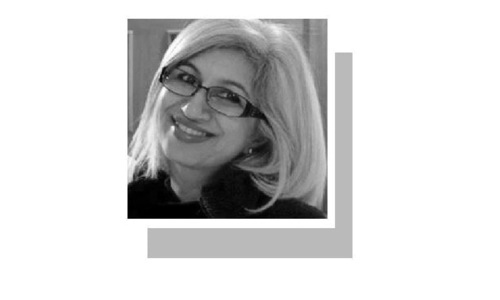•18 elected unopposed from Punjab, Balochistan
• PTI to stay as single-largest party in upper house
ISLAMABAD: As many as 59 candidates are left in the run for 30 vacant seats of the Senate following unopposed election of 18 senators from Punjab and Balochistan.
The Election Commission of Pakistan (ECP) said in a statement on Saturday that all was set for the Senate elections on April 2, as the printing of ballot papers and delivery of election material to the returning officers had already been completed.
The statistics show that the embattled PTI is to stay as the single-largest party in the upper house of parliament. The party currently has 20 members in the house and is in a comfortable position to clinch at least seven more seats from its stronghold — Khyber Pakhtunkhwa.
The commission said that in all, 147 candidates had filed nomination papers for 48 Senate seats, of whom 18 had been elected unopposed. They include seven each against general seats from Punjab and Balochistan and two each against reserved seats for women and technocrats from Balochistan. That means there will be no election in Balochistan.
As many as 11 candidates will vie for seven general seats from Sindh. Three candidates will be in the run for two seats reserved for women, four for two seats reserved for technocrats and two for one seat reserved for minorities from the province.
In Punjab where all the seven candidates against general seats have already been elected unopposed, three candidates are in the run for two seats reserved for technocrats, four for two reserved seats for women, and two candidates for one seat reserved for minorities.
As many as 16 candidates will contest against seven general seats from KP. Six candidates are in the run for two seats reserved for technocrats and four for two seats reserved for women from the province.
Two candidates each will vie for a general and a technocrat seat from the federal capital.
Those who have made their way to the upper house of parliament unopposed include PML-N’s Syedal Nasir and Shahzeb Durrani, PPP’s Sardar Umar Gorgej, JUI-F’s Ahmed Khan and ANP’s Aimal Khan on general seats in Balochistan.
Likewise, National Party’s Jan Muhammad, former caretaker prime minister Anwaarul Haq Kakar, who contested as an independent, PPP’s Hasana Bano and PML-N’s Rahat Jamali were also elected unopposed.
PPP’s Bilal Ahmed Khan and JUI-F’s Maulana Wasay have won two seats reserved for ulema/technocrats in Balochistan.
Similarly, seven members from Punjab were among those who won unopposed in the Senate elections. Elections were to be held on a total of 12 seats in Punjab, out of which seven are general seats and candidates have won all these seven seats unopposed.
They include Interior Minister Mohsin Naqvi (independent), who has served as caretaker Punjab chief minister, and PML-N’s Pervaiz Rashid, Ahad Cheema, Talal Chaudhry and Nasir Mehmood. Other successful candidates are MWM’s Raja Nasir Abbas and PTI’s Hamid Khan.
The ECP has already declared that it would be compelled to postpone elections to the extent of Khyber Pakhtunkhwa if the KP Assembly speaker fails to administer the oath to members of the assembly elected against reserved seats.
Six of those elected on reserved seats for women and non-Muslims had moved the ECP which, through an order, said that polling would be postponed if the Peshawar High Court’s verdict for the administration of the oath was not implemented.
The PHC had directed the speaker to administer oath to the members-elect and then facilitate them to cast their vote in the Senate polls on April 2.
PTI’s Azam Swati has challenged the ECP order of inking the Senate polls to the administration of the oath to the MPAs elected on reserved seats. Likewise, the KP government has also announced challenging the PHC ruling in the Supreme Court.
The situation in Sindh will be interesting where Faisal Vawda, who is said to be enjoying the support of powers that be, has also filed nomination papers as an independent candidate. In view of its clear dominance in the provincial legislature, if the PPP decides to vote for independent Vawda, then it can get at least five out of seven general seats, while the MQM-P will get one seat as well.
Similarly, PPP candidates are also likely to win two seats each for women and technocrats and one seat for minorities in Sindh. If the ruling coalition remains united in Punjab and is able to get its members of the Punjab Assembly to vote in the elections under a joint strategy, the PML-N candidates are in a position to win two seats each for women and technocrats as well as one minority seat.
Published in Dawn, March 31st, 2024











































